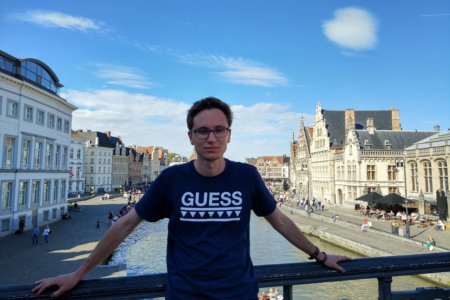
Aside from the finest salmon and stunning fjords, MSc in Finance student Sara Trajchevska, believes Norway has many perks for international students. This includes a good work-life balance, equal opportunity, and a low unemployment rate — very favourable factors for graduates, especially those who are from abroad.
Coming from Skopje, the capital city of Macedonia, Trajchevska finds her home country similar to Norway. Although relatively small, both have their own charm and charisma. “If you are a history lover, then Skopje is a must-see,” Trajchevska says.
Being an MSc in Finance student is definitely exciting for Trajchevska. She has a close circle of friends, all of whom she met during orientation week itself. When she misses food from back home, she heads to the international food markets in Oslo, where she can usually find substitutes for. Below we dive into more depth about Trajchevska’s life as an MSc in Finance student in Norway:
What made you choose to be an MSc in Finance student?
The MSc in Finance is the perfect blend of a qualitative and quantitative programme. It requires one to be both a number and people-oriented person. While challenging, it is even more rewarding once you graduate from the programme.

As an MSc in Finance student, Trajchevska believes she has gained the critical thinking skills to apply to real-world situations. Source: Sara Trajchevska
Why did you choose to be an MSc in Finance student at BI Norwegian Business School?
BI Norwegian Business School has a high ranking and a good reputation, a top 10 finance department in Europe, high-quality curriculum, and modern buildings. All of these attributes brought me to be an MSc in Finance student Norway.
Do you think it would have made a difference if you were an MSc in Finance student at a local institution in your home country?
I am very detached from the educational system back in Macedonia. Once I graduated from high school in my home country, I went to Lithuania to pursue my bachelor’s degree. After my bachelor’s degree, I came to Norway.
I feel more comfortable studying in English than in my native language. So at this point, it would be hard for me to describe how it would have felt if I had studied at home. To state the obvious, it would have been extremely different in terms of being closer to my mother and friends whom I miss dearly.

Norway has plenty to offer for Trajchevska. She has already landed a job and will start right after graduating. Source: Sara Trajchevska
What has been your most memorable class so far — and why?
At BI Norwegian Business School, my most memorable class has definitely been Applied Valuation. This class felt very practical and ad-hoc, so I feel that it equipped me well for my future work life.
How have your lecturers supported you in your studies thus far?
The professors in the university in Lithuania are the ones I am most grateful for since they offered me a lot of support during my studies, my MSc in Finance application, and my thesis preparation.
They also helped me develop professionally. Although I am in the second year of my MSc in Finance, I still keep in contact with my professors from LCC International University and keep them updated with my journey in Norway.
Do you get to apply the theories you gained in lectures halls and classrooms to the real world?
It’s not so much about the theories we learn, but more about necessary critical thinking projects. We don’t learn frameworks at BI Norwegian Business School, instead we focus on projects that could very well be assigned to us in a real-life job. Therefore, I think that there are a lot of practical learning elements to our assignments, projects and presentations.
What are your academic goals in this course? What do you plan to do after graduating?
My academic goal is to maintain my GPA grade (equivalent to an A) and learn as much as possible before I start work. During my studies, I have gained many skills — analytical, programming, critical thinking, public speaking, teamwork, and writing — that I look forward to putting into good use. After graduating, I will start working. I have already secured a job which starts in August 2021.

Trajchevska enjoys kayaking. Source: Sara Trajchevska
What do you like most about Norway?
I love the Norwegian mentality, the devotion to sustainability, as well as the importance placed on the work-life balance. I know that when discussing Norway, most people think of mountains, fjords, the Norwegian lights, and so on. Personally, I have fallen in love with Oslo. It is a city that is just the right size, not too big and hectic, but not too small either. It offers a range from modern architectural buildings, such as the Opera House and the Deichman Library, to older architecture — all of which are located on the streets we walk on daily.










